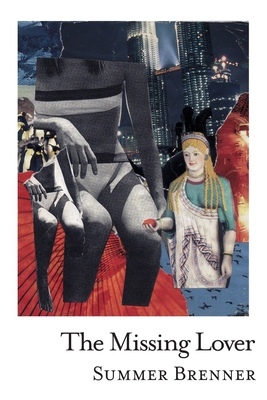Summer Brenner
Collages by Lewis Warsh
Spuyten Duyvil ($20)
by Evan Burkin
In step with the kaleidoscopic effect of Lewis Warsh’s illustrations that muddle sex and identity each time they appear, Summer Brenner captures and releases varying emotional states in every line of The Missing Lover. Her prose is endearing, fast-paced, and unwilling to let the concept of love settle into a single qualitative experience. Love is commitment. Love is editing a resume. Love is not there, which is a critical part of the three novellas that make up The Missing Lover. Brenner consistently defines love by its absence and the interjection of feelings that run contrary to it: hate, indifference, defeat. “I tried to use one of those emotional exercises where you distance yourself from the reality of another person. In this case, you.”
Two primary threads weave the novellas of this book together: love and war. While it is impossible to take a book with those leading topics and not consider the adage that all is fair, Brenner does not deploy any tropes or engage heavily with that topic. Instead, she is concerned with how the connotations of love and war communicate under different situations. Does the passion for action, rebellious or humanitarian, spur or interfere with a relationship? Is love a type of war? The faces of war and love are always donning new masks.
One shared mask in the first two novellas, The Missing Lover and A Love Story No, War, is war as a struggle between others, a conflict between groups. Sarah and Laurie, the respective protagonists, are peripheral to the events that cause large-scale discord. While Sarah has a more complex relationship with this version of war than Laurie, it is their husbands during the time of unrest who choose to partake directly in the throes of violence. And because of their significant others’ obsession, the idea of the couple becomes unstable, if not unsustainable. The cause worth dying for is always there, permeating the relationship and effectively shutting down communication: “When their room reeked of vinegar and ammonia and she asked . . . he told her to stop pestering him.”
Brenner’s depictions of love are not so one-dimensional as to say that a breakdown in communication will dissolve a relationship, nor do the similarities in the plot create redundancy. Starting with The Missing Lover’s Sarah, who “looks tucked inside [Nash] like an origami dove,” Brenner consistently delivers dynamic characters capable of navigating and determining their desires from the experiences crashing into them. Her characters are not mere instruments to compound misfortune upon to make a point. They react to their environments; they act upon their wants; they have a voice. The characters give each novella a distinct impression that is enhanced by Brenner’s ability to nurture the tone of each novella with subtle stylistic choices.
In each novella, Brenner skirts past clichés to drop readers into visceral moments that rely on punctuation: “The nurse offered her a sedative. Penance or pride, she chose to suffer. She lay on the exam table, her feet in the cold stirrups, under a blanket and shaking with cold. Beside her was the vacuum machine.” But Brenner is not walled in by violent scenes and curt sentences. Her words can also soothe and place us in “a perpetual garden of flowers in bloom and finches pecking at the thistle sacks outside the window.”
Back and forth between tenderness and violence, the reader is volleyed into the untenable circumstances of the female protagonists. And with most chapters manicured down to two pages, Brenner caters to the resounding impact of each page and allows the emotional draw of each novella to keep a strong pulse from start to finish.
Click here to purchase this book at your local independent bookstore:
Rain Taxi Online Edition Winter 2022-2023 | © Rain Taxi, Inc. 2023


